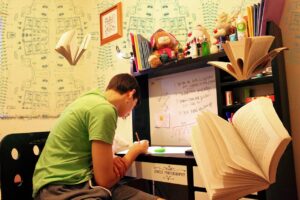Study Smarter Not Harder
Study smarter not harder means using effective learning strategies to retain information efficiently. Instead of spending endless hours memorizing, focus on techniques that enhance comprehension and recall. By adopting the right study methods, you can maximize productivity while reducing stress and burnout.
Understanding Your Learning Style
Everyone learns differently. Recognizing your learning style can help you choose the best study methods. There are three primary learning styles:
- Visual learners grasp information more effectively through visual elements like pictures, graphs, and diagrams. They benefit from colorful notes, mind maps, and infographics to enhance understanding and retention. If this is you, try using colorful notes, mind maps, and visual aids to help retain information.
- Auditory learners grasp information more effectively through spoken content, such as lectures, discussions, and audiobooks. They benefit from listening to explanations, participating in group conversations, and using verbal repetition to reinforce learning. You might benefit from study groups, podcasts, or reading aloud.
- Kinesthetic Learners retain information better through hands-on activities and movement. Practical experiments, writing things down, or using gestures can be helpful. Understanding your learning style allows you to tailor your study habits for maximum effectiveness.
Create the Perfect Study Space
A well-organized study environment improves concentration and productivity. Select a well-lit, organized area free from noise and distractions to enhance focus and productivity. Keep necessary supplies within reach to avoid distractions. Comfortable seating and a clean desk setup can make a huge difference in focus levels.
Additionally, consider adding motivational quotes or a small whiteboard to your study area to keep yourself inspired. Ensure that your study space is well-ventilated, as fresh air can enhance cognitive function and alertness.
Set Clear Goals and Prioritize Tasks


Having a clear study plan helps you stay on track. Without goals, studying can feel overwhelming and unstructured. Here’s how to prioritize tasks efficiently:
- Utilize the Eisenhower Matrix, a strategy that organizes tasks by urgency and importance, allowing you to prioritize effectively and concentrate on what truly matters.
- Break your study sessions into manageable parts and set realistic goals.
- Start with difficult subjects when your mind is fresh, and save easier topics for later.
By setting clear objectives, you’ll make steady progress without feeling lost or overburdened.
Use the Pomodoro Technique
The Pomodoro Technique is an excellent way to maintain focus and boost productivity. The method involves:
- Studying for 25 minutes with full concentration.
- Taking a 5-minute break to relax.
- Repeating this cycle four times.
- Taking a longer 15-30 minute break after every four cycles.
This technique prevents burnout, improves retention, and enhances time management. The short breaks allow your brain to process information more effectively.
Active Learning Strategies
Passive reading isn’t enough. Engage with the material actively:
- Summarize concepts in your own words – Writing summaries helps reinforce what you’ve learned.
- Teach someone else – Explaining topics to a friend or family member strengthens your understanding.
- Use flashcards – Quick revision with flashcards enhances recall.
- Take notes while studying – Jot down key points, highlight important details, and make annotations.
Active learning makes studying more engaging and effective.
Utilize Memory Techniques
Enhance recall with these proven methods:
- Mnemonics – Involve using acronyms or catchy rhymes to simplify complex information. For instance, “VIBGYOR” serves as a helpful memory aid for recalling the colors of the rainbow.
- Mind Maps – Visualizing concepts and their connections can make information easier to grasp.
- Spaced repetition is a learning technique that involves reviewing information at gradually increasing time intervals to strengthen retention and long-term memory. This method strengthens long-term memory.
These techniques simplify complex subjects and make learning fun.
Leverage Technology for Better Learning
Take advantage of digital tools to enhance your studies. Some useful apps include:
- Anki & Quizlet – Flashcard apps for effective memorization.
- Evernote & Notion – Organize notes and ideas efficiently.
- Khan Academy & Coursera – Online platforms for in-depth learning.
Using technology wisely can make studying more interactive and efficient.
Study in the Right Environment




Should you study in complete silence or with background music? The answer depends on personal preference and how your brain processes information most effectively. The answer depends on personal preference. Some people concentrate better with soft background music, while others need complete silence. Classical music, nature sounds, or instrumental tracks can create a relaxing ambiance without causing distractions.
Experiment to find what works best for you. If you find yourself easily distracted, noise-canceling headphones or a quiet library might be your best bet.
Stay Consistent with a Routine
Consistency is key to effective studying. Establish a consistent study routine and follow it diligently. Avoid last-minute cramming by reviewing topics regularly. A well-structured routine ensures that you’re making steady progress without overwhelming yourself.
Try studying at the same time each day to build a habit. Morning hours are ideal for subjects that require intense focus, while evenings may be better suited for reviewing notes and light reading.
Practice with Previous Question Papers and Mock Tests

Practicing previous exam questions helps you understand the exam pattern and identify weak areas. Mock tests simulate real exam conditions, improving time management and confidence.
Try solving practice papers under timed conditions to build endurance and reduce exam anxiety. Reviewing mistakes and understanding where you went wrong is just as important as answering correctly.
Take Care of Your Health




A healthy body supports a sharp mind. To optimize your studying, consider these habits:
- Ensure you get 7-9 hours of restful sleep each night to support optimal brain function and overall well-being. Sleep is crucial for memory consolidation.
- Eat a balanced diet – Include brain-boosting foods like nuts, fish, and dark chocolate.
- Exercise regularly – Physical activity improves focus and cognitive function.
- Drink plenty of water throughout the day to prevent dehydration, as it can cause tiredness and hinder your ability to focus effectively.
- Take short breaks – A quick walk or stretch can refresh your mind and boost productivity.
Ignoring your health can negatively impact your ability to study effectively.
Stay Motivated and Reward Yourself
Motivation plays a crucial role in studying effectively. Here are some ways to stay inspired:
- Set small goals and celebrate achievements.
- Reward yourself with short breaks, favorite snacks, or fun activities.
- Visualize your success and remind yourself why you’re studying.
Positive reinforcement keeps you motivated and makes learning more enjoyable.
Conclusion
Studying smarter, not harder, is about using effective strategies, managing time wisely, and maintaining a balance. Identify what works best for you, stay consistent, and make learning an enjoyable process. With the right approach, you can boost productivity, retain information efficiently, and reduce study stress.
Remember, it’s not about how many hours you spend studying but about how effectively you use that time. Keep experimenting with different techniques until you find the perfect study routine for you!
FAQs
1. What is the best study method?
The best method depends on your learning style. Active learning, using memory techniques, and the Pomodoro Technique work well for most students.
2. How long should I study each day?
It varies, but 2-4 hours of focused study with breaks is effective. Quality matters more than quantity.
3. Can music help with studying?
It depends. Soft instrumental music can help some students concentrate, while others prefer silence.
4. How do I avoid distractions while studying?
Find a quiet place, turn off notifications, and use apps that block distractions.
5. Is cramming an effective study method?
No, cramming leads to short-term retention. Spaced repetition and consistent review are better for long-term learning.
**Please don’t forget to leave a review.
Click here to study smarter with the best online tutors!
